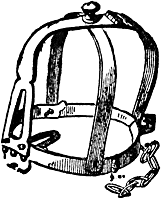(New Instrument of Threes)
- page one -
(The Study of Threes)
http://threesology.org

The Novum Organum, is the truncated (two-word) title to a philosophical work by Francis Bacon that was written in Latin and published in 1620. The full (three-word) original title and its translation are:
New Instrument of Science

This is a reference to Aristotle's work Organon, which was his treatise on logic and syllogism. In the Novum Organum, Bacon details a new system of logic he believes to be superior to the old ways of syllogism.1 This is now known as the Baconian method.
(Copy of a lost bronze bust of Aristotle made by Lysippos (4th century BCE), It is now housed in the Parisian Louvre.)The title page of Novum Organum depicts a galleon passing between the mythical Pillars of Hercules that stand either side of the Strait of Gibraltar, marking the exit from the well-charted waters of the Mediterranean into the Atlantic Ocean. The Pillars, as the boundary of the Mediterranean, have been smashed through— opening a new world to exploration. Bacon hopes that his empirical investigation method will, similarly, smash the old scientific ideas and lead to greater understanding of the world and heavens.
The Latin tag across the bottom ("Multi pertransibunt & augebitur scientia") is taken from Daniel 12:4. It means: "Many will travel and knowledge will be increased".
|
|
In the "Novum Organum Scientiarum," Francis Bacon advocated the painstaking collection of miscellaneous facts without any recourse to prior theory. In this sense, "miscellaneous facts" might well be construed to illustrate randomness in terms of a haphazard accumulation of information which may be disparate. This activity has never been adopted as a practical method of research; which, in part, requires that collected information be related to a given topic of research. Despite this, his "Baconian Method" was of some importance in the establishment of the Royal Society some 40 years later.
With respect to syllogisms1, here are a few examples of differently labeled formulaic references:
|
3-part Logic Thesis ~ Antithesis ~ Synthesis Indulgence ~ "Middle Way" ~ Ascetism Major Premise ~ Minor Premise ~ Conclusion Contradiction ~ Excluded Middle ~ Identity Principal | ||
| "God-ology": Omnipresent Omnipotent Omniscient |
"Metaphysics-ology": What is real How change comes What is mind |
Marxian "Dialectology": Unity of opposites Quantity & quality Negation of negation |
| Epistemology: How we know What is truth What is mind |
Axiology: Nature of good Nature of beautiful Nature of religious |
Ontology: Quality (1st-ness) Relation (2nd-ness) Representation 3rd-ness) |
- 3 times the fool:
- You can fool some people some of the time
- Some people all the time
- But not all people all the time.
- 3 traditional syllogism forms:
- Categorical
- Hypothetical
- Disjunctive
- 3-patterned basic adult syllogism:
- All ravens are black
- Jack is a raven
- Therefore, Jack is black.
- 3-patterned basic child syllogism:
- Fuzzy Wuzzy was a bear
- Fuzzy Wuzzy had no hair
- Fuzzy Wuzzy wasn't fuzzy was he?
|
And, let us not forget to include the following "syllogism" as seen on a T-shirt:
...The last one is spoken in a rapid manner, as in the vocalization of a song, and might also remind some readers of the cartoon dog character called Scooby Doo. Which may or may not influence some to call this the Scoo-by Doo-by syllogism. |
Of course, this is not to say that all patterns-of-three should be looked upon as presenting us with different forms of a syllogism, even if a reader would like to make the assumption themselves and write a paper from such a perspective; that many, including myself, would read because we have entertained a similarity of divergent thought processing...
...And even though one might want to make a syllogistic case for the tri-partite "balancing" act said to be inclusive in the American form of Federal government divisioning:
- Executive
- Legislative
- Judicial
Instead of the purported "Checks and Balances" equanimity..., we very often see the clown-like display of a Rock - Paper - Scissors counter-balancing routine reaching a laughable level of inefficiency and Lilliputian nonsense of which end to crack an egg open. Even simpletons shake their head at the stupidity so often exhibited by the U.S. government's intended purpose, direction taken and final resolution achieved. How in the world can then be so many individually intelligent people in America and yet the country ends up with so many who collectively act very often like an idiot who gets its wagging tongue stuck to an ice block of cold tax-generated cash by imagining it be a heaven-sent confectioned dessert?
And with a deeper extension of one's tongue-in-cheek, as if to pretence the extraction of a bit of food lodged in the crevice of two over-lapping teeth, one might even want to explore the syllogistic perturbations of a tri-partite combo-meal, involving:
- Hamburger (sandwich)
- French Fries (side order)
- Soft Drink (beverage)
Clearly, since many different tri-partite associations might well be labeled a syllogism, including those based purely on pictograph forms such as geometric illustrations (for example, the line - circle - triangle configuration or the X - Y - Z graph designations). And let us also take for example the interrelated (reciprocally connected) "three persons-in-one" reference to the Christian Trinity, we should strive to impart some clarification of what actually is meant by the word syllogism as is traditionally denoted, even if the future affiliates itself with a new construct.
And one must ask whether there was a preponderant usage of three-patterned expressions in Aristotle's time and place that he not only made a mental list of various examples, but use his syllogistic model as a means of collating and enforcing, like some religious mystic bent on forming a cult and thus devised a presumed "The Right Way" of thinking, because various people where saying the same three-patterned expressions and ideas, in different ways? Was Aristotle a control freak wanting to dominate a conversation as seen in the behavior of some during social gatherings?
Here's a reference from an old copy of The New American Desk Encyclopedia:
The valid form of an argument consisting of three statements: two premises and a conclusion. The conclusion of a valid syllogism follows logically from the premises and is true if the conclusion is true.
However, now we've got to have some basis for understanding what is meant by "logically" for -shortened to "logic". For the sake of consistency, I will use the same previous mentioned source:
Logic, the branch of philosophy concerned with analyzing rules that govern correct and incorrect reasoning, or inference. It was created by Aristotle, who analyzed terms and propositions and in his Prior Analytics set out systematically the various forms of syllogism; this work has remained an important part of logic ever since.
But before dipping our toes into the subject let's look at a reference from the Wordweb dictionary:
"All who attempt to syllogise...
from things less credible than the conclusion,
manifestly do not syllogise rightly."
Aside from the obvious usage of the syllogism as an expressed form of intellectual gaming exercise, the above quote seems to suggest that if you already do not have a real conclusion about the conclusion, then the two preceding premises are dysfunctional:
Yet, if you are already certain about the conclusion, then there is no need to present the conclusion as being derived from what amounts to is a contrived system of thinking in order to present the "answer" as an infallible, inevitable (and enviable) conclusion which is logically derived from premises that were "conjured up" in order to support what you already knew, or thought you knew was correct in the first place. Indeed, in reverse order, a conclusion is true if its two preceding premises are true. The simple sentence of 1 + 2 = 3 is the same as 3 = 2 + 1. Yet, because it is so easy to grasp, it is like fish bait which can hook you into creating a whole system of thinking based on a rationale of a simplistic three-part structure; but which remains oblivious to most people as a reference to a much larger consideration involving an embodied listing of "threes phenomena" requiring a superseding form of logic.
Clearly, an Aristotelian form of syllogistically-branded logic is little more than engaging in a silly form of mental gymnastics like some kid swinging from a limb trying to show off to the neighborhood kids that they have some ability others don't; perhaps only because the other kids have other things to do and don't want to indulge in this form of one-up-man-ship contest with someone who, upon losing, will devise some other task that they may have "stacked the deck" in an attempt to insure that they win, like so often happens in American politics. In other words, it's a waste of time with the desired outcome is controlled by the thinking processes of an operator whose is bent on winning at whatever cost. Such an exercise is indulging in silly syllogistic substitutions like the derivations of patterns used in quilts, rugs, and neighborhood "taggers" using cans of paint to scrawl what they think are "intelligent messages" of graffiti. There are lots of different types of hustlers.
It's no wonder Francis Bacon wanted to provide a new way of thinking that was different from the aforementioned "Old Way" of syllogistic nonsense he must have had to endure in his intellectual encounters, which may have been exceedingly more non-sensical than those made up today and laughably used as a measure of one's intelligence by those who think an adequate level of attendance to such nonsense is a superior form of thinking; like many who posture their ego much taller than those whom they beat at a game of chess, poker or even tiddly-winks! And to put such nonsense into a present day colloquial shade-tree perspective, let me provide some examples:
- It's like putting an electric switch on a lawn-mower's spark-plug and thinking you're being innovative instead of deliberately trying to change something simple into a contrived form of complexity in an attempt to convey to others (and yourself) that you are more intelligent than you actually are, even if they couldn't (or wouldn't) do the same thing.
- It is also like a flim-flam man's way of selling you a ticket to walk across a bridge that is free to walk across in the first place. (The naive and gullible might well buy the Brooklyn bridge if presented with a freshly printed certificate -of- ownership that is sold for several hundred percent more than what it cost the con-man or woman to have the certificates printed up. Modern businesses, governments and religions have their own con-games.)
- Similarly, it is like an accountant who starts a tax preparation by stating how much money they might be able or want to save or receive as a tax rebate; and then "fudges" the preceding numbers (major and minor premises), in order to insure the desired outcome (conclusion) is "logical" to those who are interested in this form of enumerated "logic". Another vernacular is to call it "creative accounting".
Such exercises in developing premises which coincide with a particular conclusion are superfluous... like adding multiple layers of cake and/or icing to a cake in an attempt to make the cake look larger and more significant in size than it actually is... perhaps, thereby diminishing or minimizing one or more observations regarding some interpreted deficit... as many a bride does when striving for a "perfect" wedding. Then again it is also like someone wanting multiple scoops of ice-cream but the day is so warm, that only one scoop can be eaten because the others will melt onto your hand. And as a final example, it is like eating three cookies when your craving is sated by eating one, but you didn't want to save an almost empty package that would be better for the environment if it were put into a recycle receptacle after the other two cookies were eaten. Yep, crazy "logic" has many forms frequently denoted as rationalization... something all of us might be suspected of engaging in from time to time.
A "non sequitur" is a conclusion that does not follow from the premises. Here's a comic illustration of this form of logic:
What goes unnoticed by most people is that the 4-segment cartoon layout very often displays a 3 -to- 1 ratio content. The first three set up the conditions for the final punch-line, even though verbalized jokes use their own three-patterned syllogistic pattern typically involving three elements or characters. I do not know when this 3 -to- 1 comic type of illustration first began... And I do not know if this is a modern or ancient pattern used by those who told jokes in the ancient past. Then again, I am only guessing that the jokes of the past were of a similar 3-part arrangement to those of the present. While it is easy for many to recognize three characters in a verbalized joke or story, this is not necessarily the case for written jokes. Whereas some people actively count elements in verbalized comments, they may not do so in written forms, or vice versa.
The point in bringing up this momentary digression during a short expose' of the syllogistic process, is to bring to the fore the recognition of making comparisons between intellectual patterns in use in one subject area, and those used in other subjects to identify whether or not there is an existence or absence thereof. For example, what is the type of logic used by nature, irrespective of human biases? Do we find examples of a syllogistic process being used by nature in such things as DNA, RNA and Proteins? In such a case, what can be found is that although a "Triplet" coding system is used, this vernacular leads many to overlook the existence of four amino acids aligned in a 3 -to- ratio way. Please note that I did not say 3 "+" 1, since the usage of the symbol-denoted word "plus" departs from my future intended explication of where such a pattern might well have originated and what this may mean for future forms of logic which are "in-tune" with nature and are not era-specific, nor mechanistic-specific contrivances (such as the age of computers and it human-imposed structures of Boolean logic which may appear to have wide-spread level of applicable truth... simply because of all the time, effort and other resources spent there-on).
Before continuing on our journey, let me briefly describe the impetus for the usage of the present title and a very general outline related to its overall presentation... that some readers may feel has too wide a swath like an abandoned ship's helm being steered by an inebriated stow-away recalling the Rime of the Ancient Mariner and charts a course away from every bird thought to be an albatross.
The title of this page "Novum Organum Threesiarum" is to be translated as the New Instrument of Threes... though I couldn't find an exact English -to- Latin equivalent for the word "threes". But so long as you know this, and permit some "artistic (writing)" license, all will be well with the weather as we proceed further along the course of our present journey. The "Novum Organum Threesiarum" is sorely needed because there is so much superstition, urban legend, and sycophantic religious nonsense being regurgitated again and again and again, thus effecting the proverbial "reductio ad absurdum" (reduction to the absurd). However, I too will have to participate in the exercise of referral to such ideas as a method of illustrative contrast.
While the word "instrument" was not intentioned to be interpreted as referencing a musical instrument; for the sake of playful conversation, let us do so and follow its melodious entreaty, for just a moment, by alluding to the following commentary as the notations one might see on a music sheet, indicating different instrumental accompaniments for an orchestrated symphony... for example, like a three-movement concerto. However, be forewarned. If you hum it, you might then whistle it. From whistling can emerge a song, and then from a song into a life-long chorused refrain thereafter used as a:
- Whimsically-personified and sentimentalized ditty, -or-
- Self-imbued patriotically-styled intellectualized anthem. -or-
- As an internalized 'voice' of a destiny waiting to unfold.
Under the present heading of this page, I will attempt to create the impetus for an intellectual environment from which will spring a reconsideration of the "Scientific Empirical Method" paralleled with the "(Philosophical) Baconian Method" so that an inquiry into accumulated information derives an acceptable model of eventual predictability... in as much as a scientifically derived hypothesis might well generate. Simply put, a reconsidered approximation (i.e. "open-mindedness") of a large collection (of "threes" or whatever), might possibly yield useful and applicable considerations and not remain as a collectible "oddity" such that valuable relics are found and then placed into a drawer or box and then "rediscovered" years later by someone searching through archives in a musty old University repository.
|
Nonetheless, distinctions need to be acknowledged in terms of acquired truth
that may be based on... |
Measurable truth supported by verifiable and repeated experimentation is frequently quite different from theory such as that which occurs in religion and other brands of philosophy. In other words, Religion and Philosophy frequently assume the existence of "proof" as based on one or more "thought experiments" or highly elaborated argumentation without any attempt to verify the so-called "revealed truth" by way of a practical experiment which can be repeated by others... who may not believe in the religion or philosophy; but nonetheless acquire similar results through replication of an experiment. Very often, different "thought experiments" are bantered about like a chess game played on a visualized holographic board amongst those interested in the same type of game. The "winner" is selected, or a "tie" is announced through one or another form of agreement, amongst those who think one or another thought experiment (game play), gives the impression of being the most satisfactory maneuver. Yet, none of the players in this game may carry out an experiment to verify an idea. Someone else, an interested bystander, may seek to substantiate or deny a claim by way of a given trial and error process... which may not be applied until years later, by yet another interested bystander.
However, and this is an important point:
Useful (Empirically derived) theories for which experiments may be developed to test, are based on accumulations of data... and not necessarily experiment-derived data. But not all researchers make what can be called a "psychic connection" between examples of the collected information to generate an hypothesis which can be carried over into a scientific paradigm. Their minds do not perceive tell-tale signs which need further investigation. Yet, one must wonder if even a mind that is "prepared" to make such distinctions, would do so, if no situation arises from which to garner (and memorize) the multitude of information their mind necessitates and collates as being useful to a given line of thinking.
For example:
- Would Albert Einstein (1879-1955) have made his discoveries (by way of "thought experiments") without being subjected to the "disparate"- but related information in the Swiss Patent office where he evaluated patent applications for electromagnetic devices?
- Would Charles Darwin (1809-1882) have made his "Evolution" discovery if he had not went on the HMS Beagle voyage?
- Would George Washington Carver ((1864-1943)) have made his discoveries for the many uses of peanuts, soy beans and sweet potatoes if he had, instead, been born to suburban middle class or wealthy parents who never experienced poverty or slavery or he had been born someplace else in the United States or the World?
Would such minds have made other discoveries instead, if subjected to different disparate forms of information applied to a singular focus... like a prism that can be interchangeably used to reverse multiple bands of color into a singular focus or vice-versa? Can such an ability be taught above and beyond common expressions thereof?
The word "Empirical" generally denotes an internalized toolbox of different) investigative techniques used not only to collate different ideas, but to analyze and work out some testability of verification. However, no matter how intelligent we might like to think we or someone else is in providing a rationale for one or another technique, they can still be wrong. But if everyone in a given community thinks a particular Empirical model is correct and the results do not verify the assumptions (theories/hypothesis), then such a community is likely to dismiss the notion that the methodology is wrong and will instead, claim the results are wrong because something went wrong with the testing procedure... because "everyone knows" what the truth is anyway.
Part of the aforementioned argumentation typically provides excuses defined as reasons for the inability of an experiment to be carried out. While this alone should then hold the topic in some measure of suspension, not only for reflection but a serious reconsideration; it is dropped into the path of others like an unreflective shattered mirror, who then take it upon themselves to wade through the splintered glittering waters instead of going around or building a suitable bridge over. While this would seem to be an honest means of presenting the idea(s) for scrutiny... as in a "peer review" environment, we can typically observe the information being given to the naive to use as personal guide posts during moments of intellectual development... and later as shields and weapons against those who may not share a similar view. Another way of viewing this is to say that simply because one believes in a particular religious faith, a god, or some sort of philosophy, does not mean they automatically qualify for being able to see truth in all regards.
Once they've gotten their feet wet and perhaps even muddied by all the frothing and perspiration (or even crusading blood) of interacting with those embarking on the same or similar route of exercise (though the trail and purpose may be individually defined like different religions are thus singularly named and practiced), they might well immerse themselves with an expenditure of energy as if it were their life's savings... thereby convincing themselves that their "purchase" was a good investment that others should joyously imbibe in like some elixir-of-youth narcotic for which different songs are devised and sung in unison about just like so many beer-hall songs. To such people, lack of proof does not negate the possibility of truth... which becomes their chosen standard of belief without need of verification other than holding a belief. It is comforting for those whose would-be efforts at attempting any measure of definitive experimentation may simply be based on a lack of confidence to try.
However, it should be noted that while similar results can be achieved by re-producing similar experiments, this does not mean the usage of a particular experimental form actually produces a proof pertaining to a larger or even realistic question that may be a necessary consideration in the overall formula. The experiment's results may be, themselves, experimental... based on an incomplete or even useless formula; though researchers sometimes engage in their own form of "Baconian Methodology" by collecting experimental types and results from different fields which give the researcher the impression of representing the answer to some variable when they attempt to philosophically apply their results to a larger spectrum of considerations. In other words, the experiment, the reasons for the experiment, and the results of the experiment may be erroneous, no matter how many people believe in them. And presumed intelligent people or authoritative figures in such a situation, simply adopt the syllogistic method of:
To impose their views
For accepting their "truth" (nonsense).
(Varying methods of imposition have been used throughout the centuries such as: bribery, laws, rules, injunctions, tariffs, edicts, threats, intimidation, deprivation of goods, services, freedom, etc...)
For example, one can design an experiment to verify desired results to substantiate whimsical claims such as the "ducking"-in-water method once used by religious leaders (or other authority claiming a religious affinity) to test the validity of whether or not someone was a witch, though the word "cucking" appears to have been first used and did not necessarily refer to someone being dunked in water.
See Wikipedia article: Cucking Stool
Initially, references note that it was women in particular who were subjected to devised forms of humiliation in an attempt to keep them from creating disconcerting social situations because of gossip or, we can only imagine, what spewed forth from the mouths of those living in distant ages under unsanitary, superstitious, malnourished and illiterate conditions... when we compare it with today's "modern" standards of colloquial forms of ( ! ! ! ) "sane and civilized" elocution.
Not only might one's neighbors participate in claiming you to be a problem instigator for individual concerns, but they could also join in unison to claim you were in league with the devil and responsible for all sorts of social discontinuities. Because of this, the collective imagination of the group would devise some means of "distracting" either you away from the presumed evil or wrong doing, or distract the evil away from you. In most cases they were not actually trying to find a means of "muffling" the presence of the assumed evil, but actually wanted to remove the muffling social restraints upon themselves so that they could have a legalized means of shouting and screaming in unison together towards a singular item, object or instance.
And while the following images show a form of social "muffler" in use in the "olden days", modern society has its own varieties that generally take the form of distraction called sports, entertainment, exercise, over-eating, and various types of intoxication or "getting high", both legally and illegally... some of which do quiet the "roars of the beast" within oneself, but most only provide a socialized means of expressing the "repressed" roars. Sporting events, permit a type of collective "mouthing off" in support of one's team or individual player frequently in the form of voicing discordant opinions about a referee, umpire, judge, or opposite team, team player or/and coach.
But let us not forget the collective voices heard at political rallys, protests, church services, and social gatherings such as birthday parties, cookouts, fairs, circuses as well as high school and college parties. However, intoxication (drugs, alcohol, sleep deprivation, or exposure to some other chemical substance lead to a person's silence by numbing their brain, putting them to sleep, or making them pass out.

In medieval times they would attempt to shame a drunk by placing them into a barrel (The Drunkards Cloak), so that everyone could make fun of them. An attempt to shame people into changing their ways from committing unlawful acts is also presently used in Albuquerque, New Mexico in America, by printing their name in a particular section of a newspaper. The only problem is that it shows them that there are others doing the same thing and that this merits a consideration by some that "they are not the only ones", which gives them support instead of the community hoped for mirror-imaged reflection to change one's ways. For some, committing another offense and seeing their name in the paper is a means of shouting back... which is a tell-tale sign to the root of their problem.
In the following is an account of punishment being rendered as a test of guilt or innocence that was once used in India. I want to contrast it with the test for guilt and innocence as depicted in the above dunking method. The excerpt was taken from page 87 of a paperback entitled "The Epic of Man", A collection of readings by L.S. Stavrianos. ©1971 by Prentice-Hall, Inc., Englewood Cliffs, N.J. 13-283325-5, Library of Congress Catalog Card Number: 77-159452. The original source is listed as: From Si-Yu-KIi, Buddhist Records of the Western World, trans. Samuel Beal (London: Kegan Paul, 1884), I. 70-89.
The chronicler is reported to have been a Chinese Buddhist pilgrim who made the journey to India between 635 and 643.
...In the investigation of criminal cases there is no use of rod or staff to obtain proofs (of guilt). In questioning an accused person, if he replies with frankness the punishment is proportioned accordingly; but if the accused obstinately denies his fault, or in despite of attempts to excuse himself, then in searching out this truth to the bottom, when it is necessary to pass sentence, there are four kinds of ordeal used— (1) by water, (2) by force, (3) by weighing, (4) by poison.
- When the ordeal is by water, then the accused is placed in a sack connected with a stone vessel and thrown into deep water. They then judge of his innocence (truth) or guilt in this way— if the man sinks and the stone floats he is guilty; but if the man floats and the stone sinks then ie is pronounced innocent.
- Secondly, by fire. They heat a plate of iron and make the accused sit on it, and again place his feet on it, and apply it to the palms of his hands; moreover, he is made to pass his tongue over it; if no scars result, he is innocent; if there are scars, his guilt is proved. In case of weak and timid persons who cannot endure such ordeal, they take a flower-bud and cast it towards the fire; it opens, he is innocent; if the flower is burnt, he is guilty.
- Ordeal by weight is this: A man and a stone are placed in a balance evenly, then they judge according to lightness or weight. If the accused is innocent, then the man weighs down the stone, which rises in the balance; if he is guilty, the man rises and the stone falls.
- Ordeal by poison is this: They take a ram and make an incision in its right thigh, then mixing all sorts of poison with a portion of the food of the accused men, they place it in the incision made in the thigh (of the animal); if the man is guilty, then the poison takes effect and the creature dies; if he is innocent, then the poison has no effect, and he survives.
By these four methods of trial the way of crime is stopped.
The above "system of justice" used a form of reverse psychology in that they represent a means of curtailing crime by those whose logic comprehends that the prevailing system of justice has an over reliance on the potential of finding someone guilty as opposed to being innocent. Instead of a person being viewed as innocent until they are proven guilty, a people lived in a cultural framework in which the people experienced a form of persecution to be lawful... like a parent wielding their own brand of justice by way of threatening punishment by them, another adult, some demon (human or otherwise), or God. However, there are those willing to test the veracity of a system through a different type of logic by intentionally engaging in something which might well bring them in front of a 'court of justice.' Be it that they are able to withstand the currently used forms of punishment, or that they imagine one or more others will see the incongruity of a system and rise up to save them by changing it. Many do not see the need to change a system of justice that they understand and can live with, particularly if no viable alternative is provided for substitution.
With respect to (mostly) silent forms of shouting, with respect to individual participation, we have suicide attempts, daredevil stunts, combatant sports (boxing, martial arts, hockey, etc.,) contract bidding, auction "bartering", anti-social "expressions" such as homosexuality, tattoos, sticking piece of metal in different parts of one's body; and other social "statements" by way of vote casting, apparel presentation, photography, artistic endeavors, etc...
 |
 |
| Tudor crime and punishment, by Mandy Barrow | |
Note: not only was the woman's mouth "taped" shut, but when you turn the above head piece upside down, you might envision a chastity belt that was designed to keep women from opening their legs to have sex with just anyone they wanted. I don't recall such a belt ever being designed for men. With respect to "taping" shut the minds of women, men have devised various forms of manipulation and at times, out-right exclusion of ideas, discoveries, and participation in order to "constrain" a woman from making a "public spectacle" of herself (thereby overshadowing the dominant males in a given field). As for the headgear, helmets and mouth pieces serve only to dampen the mouths of players during football games... or we might say serve to protect the men so that they can preserve their means of voicing their opinions after the game.
However, it should be emphasized the operative word being referred to is
...since the accused person is alternatively or collectively immersed in water, public scorn, condemnation and ridicule, silence, fire, confinement (immobility) or/and death.
"Immersion" viewed as a "Three R's" representation:
- Psychoanalytically speaking, the act(s) of immersion may be a symbolic act of returning to the "waters" of the womb so that a re-birth, a rejuvenation, a reincarnation may take place.
- Students are supposed to be immersed in the public school system's "Reading - 'Riting - 'Rithmetic" formula "within" a classroom as a "seminal" approach to a well-rounded education.
- The act of baptizing in religion clearly represents this activity. Yet, if we regress further into our biological past, such acts of immersion may be a repetition of history reflecting different evolutionary stages— if not pristine biological ones which reference life in the primordial waters frequently referred to as the primordial soup or broth... a sort of salmon-like activity which swims the turbulent waters upstream towards its (assumed?) birth place.
In one reference to the methodology employed, the accused was kept under the water for three minutes. Along with the image below, occurred the notes that 'the right thumb of the person was tied to their left toe before they were dunked three times'. (Bending the person over no doubt facilitated an inability of the person from taking in a deep breath.) If a person drowned while being immersed in water, it was then said that they were innocent, but upon dying, meant they were now in a better place as thus described and defined by the person's torturers! Yet the religious (or other) authority was not likewise convicted of murder, but, we might conjecture, were instead... honorably extolled as having carried out the work of their munificent god or lord.

Mandy Barrow's Project Britain
|
And we can imagine that certain individuals were convicted (and subsequently killed) simply because they would:
|
 Primary Homework Help, By Mandy Barrow |
- Confessed in the mistaken belief that they would be spared or given a more swifter, and thus, less painful execution... typically, they were hanged or burned alive... but I don't know for a fact since I am only relating what I have read.
- The person in charge of the dunking intentionally raised and lowered an individual several times before they could drown, thus providing "proof" to witnesses of a person's presumed guilt because they hadn't drowned in an interval of time defined by the accuser as being reasonable to kill a "normal" person.
 Fylde and Wyre Antiquarian |  Chambers' Book of Days |
See Also:
- 10 tests for guilt used at the Salem Witch trials
- From a confessed witch practicing her art: Witches in Art

It should be noted that living in an urban area, however it can be described in one's time and place in history; usually sets the stage for a collective mindset to exhibit some sort of lynch mob mentality. Yet, this is not confined to villages of old or present day neighborhoods. Entire nations of millions can be manipulated by the "forces" of authority (political, religious, business, journalistic), to participate in periods of madness which are "justified" by rationalized protocols.
When we look at the circumstances of those committed to death by being called a witch in days of old (or terrorist in today's terminology)...
...The church or some other official confiscated the condemned person's property, money, or even members of the household, as their own... or gave the resources to someone they thought was most "deserving". Yet, the dunking method has not been universally used by authority. In present day contexts, they sometimes use different forms of "immersion" that produces literal or social suffocation:
- War or "police action" to have the accused immersed in social panic, governing disorder, and even blood loss leading to death.
- Immersion by way of enforced privations due to high tariffs, blockades, sanctions, etc...
- Genocide without witnesses (typically immersed beneath dirt in a mass grave).
- Claim a "Holy war" because some religious effrontery took place. (Immerse the accused with public claims of religious insanity or Infidel-ity.)
- "Accidental" dropping of bombs ("immersed" by bombs and debris.)
- Corroborate with other "the good guys" to "find by chance", incriminating evidence such as documents describing efforts to develop weapons of mass destruction. (Immerse the accused in artificial and planted evidence).
- Assassination (character or otherwise producing social ostracism by way of condemnations or burial).
- Legal battles which immerses one or more in allegations, intimations, financial debt, public ridicule, public support, public controversy.
- Chemical warfare immersion.
- Use of "overwhelming" force to immerse the accused through actual or presumed intimidation.
- Conflict instigation (to validate "intervention for the innocent") and immerse the public in turmoil.
- "Collateral damage reasons" (The "honest mistake" ask-for-forgiveness acted-out contrite plea (for everyone to express "Christian/religious charity") which immerses the public's attention so that something else can be hidden or take place).
- Murder of citizens claimed to be caused solely by terrorists (For example, the destruction of the Twin towers in N.Y., which immersed the public in variegated forms of irrational emotional responses which obliged the government to carry out its intended plans which made a lot of money for companies that supported particular political campaigns).
- Chemical spills (immersion by way of poison) and perhaps give an excuse to do something such as get a company out of a country, thereby stalling its debt repayment.
- "Immunization" (immersion) with disease.
- Deliberately giving food to governments who exchange it for more weapons. (Immerse the public's attention from noticing criminal activities taking place elsewhere.)
- Etc...
If authority wants you dead, whether you are either innocent or guilty, they will either suppress or create the necessary proof (reasons) and either claim that they are infallible as did the business, political and religious leaders of old, or in present day political lingo, claim there is or was "credible evidence" (or some other era-specific terminology). And if the so-called "credible evidence" used to conduct an action is later found to be questionable, it doesn't matter because the action will have already occurred and those claimed to be responsible for the (minimized) "inaccuracy", will be permitted to resign with no admission of socially stainable guilt and receive their full pension and benefits.
While skunks may have learned to change their coloring, they nonetheless still stink. Instead of stopping to smell the roses, people should acknowledge that the stench in the air is not solely from polluting vehicles and factories. The minds of people are being poisoned by businesses, governments and religions, just as well as their bodies. Whereas you might think that educated and experienced people are immune from advocating the madness exhibited by persons in these three entities, they are more likely to use their experience and education to manipulating the public into a greater acceptance and participation thereof. The human processes of thinking is a mighty strange thing.
Most people think of themselves as normal in most respects, while others conceal an inclination towards thinking they have some uniqueness, even some talent, giftedness, or genius that is not widely known. Some attempt to exhibit this by way of winning at a game such as checkers, chess, cards, billiards, or more physical games such as rugby, football, basketball, etc... But many others think otherwise. The don't interpret anything they do past some measure of "typicality"... that in some cases makes a person very uneasy because they might have to "prove" their assumption and then defend it as well since there are those who want to try to knock you down in order to build themselves up.
In any respect, the human mind is a very strange animal; part domesticated, part wild, and with a potential to be something else. I think everyone has this "something else", however you care to define and label it. Some of us just practice at seeking it out to make its presence more pronounced. Even if the pronouncement is not seen or heard by anyone. Yet, this is often difficult to do while living in a social environment in which we may come into contact with one or more others on a daily basis. It is even more difficult to seek out this "something else" when others want you to be that which best helps them to identify what and who they think they are. To be different than this can create discordances, at times both externally and internally.
For example, it has been said that in order to stir one's creative processes, it is necessary for someone never to get too comfortable. Yet, this expression can cause problems for those who misinterpret the idea of "discomfort" when applied to themselves and their judgment of what they think their "something else" is.
A person's own "something else" can be so new, so original, that an attempt to use one's era-specific forms of expression become part of the hindrance to what they think might be a "full expression" of their uniqueness. Experiencing discomfort in an attempt to enhance one's creativity doesn't have to mean confrontation, disease, abuses, or any extreme. It doesn't necessarily mean you have to be a "starving artist" or experience poverty such as living out of a vehicle, in a doorstep, etc., until one is "discovered". You may never even be understood in your life-time, much less "discovered"... given the many accounts of those who are recognized after they died. For you to discover and acknowledge your own or another's "something else", may require you to think differently, like many a sports and wilderness scout have had to in order to make a discovery that might otherwise go unrecognized.
People often overlook attempts to foster a new appreciation of thinking differently if it comes from someone whose religious, political or educational ideas are viewed as bad or wrong. People generally have difficulty in separating a person's ideas or behavior into separate spheres of activity, even though all of us engage in different disassociated activities every day... at least to some degree. For example, a person may go to church one day expressing piety and generosity and then the very next day be seen as a back-stabbing, double-dealing business owner. While such an overt expression might well be called an hypocrisy, it is not viewed as an act of insanity, because similar behavior is wide-spread. With the adoption of the "separation of church and state" perspective, all sorts of allowances are permitted, even immoral and illegal acts, so long as you are not caught breaking some law or social impropriety for which you will be censored, jailed, or socially ostracized.
Some people judge you totally on what music you listen to. Others, by behaviors such as smoking, drinking alcoholic beverages, drug usage, religious affiliation, wardrobe, whether or not you own property and where you do, etc... By so doing, they disallow themselves to even consider anything you might think, plan or attempt to do, even if they think, plan and want to do themselves. In short, in some social instances, there are a lot of barriers to surmount in order to influence a person or group. Intelligent people are no exception. However, in all fairness, we must say that there are many "really true" open-minded people in different walks of life. Nonetheless, a topic such as the "threes phenomena" will still need to surmount the many forms of "open mindedness" obstacles. Admittedly, my usage of language is one of them.
As I have likened the Novum Organum Threesiarum to a voyage en route to new lands to be charted and explored, the reader should be inclined to view each page as an island, coral reef, or another ship (with or without ghostly passengers) which have been encountered. Granted, some stays are shorter than others when in search of intellectual sustenance, only because it goes against common sense to tarry long when head-hunters seem to be about the place from time to time or an iceberg has been spotted. But as indicated in the Preface, this journey will be a long one and I have no intent on turning around to take you back to where you once stood. You can get off this ship any time you want of your own free will, but if you cause trouble amongst the other passengers or crew, you might well be asked to walk the plank. Such are the rules of the High Seas when in search of treasure... whatever form puts a glint in your eye.
Note: Along with the linked sources cited, I have used information from The New American Desk Encyclopedia (©1989 Concord Reference Books) that was found in an old house being cleaned out by the person who was going to attempt some renovation thereof. He had thrown it into a pile to be discarded with other debris, so I took it to read since I was almost finished with H.G. Wells' Outline of History. ("Novum Organum" was mentioned in the short article about Francis Bacon.) In some instances I have inter-mixed the information about the same topic... along with my own views. If I miss a citation, I will correct the oversight as soon as possible. In no way is there any intent to plagiarize nor misrepresent, though such a case might be viewed if someone thinks I have misinterpreted information used in context. Every author and publisher is entitled to be given their due credit. I sometimes forget to contact a source for permission when they denote that they want to be contacted, because I am frequently working on several different pages at a single time.
Posting Update: Monday, October 27, 2014
HTML (4.01) update: Sunday, May 26, 2019... 8:30 AM
Latest update: Sunday, September 8th, 2019... 12:08 PM
Your Questions, Comments or Additional Information are welcomed:
Herb O. Buckland
herbobuckland@hotmail.com